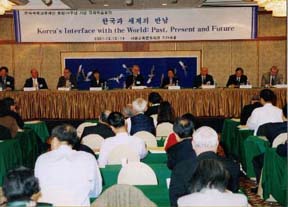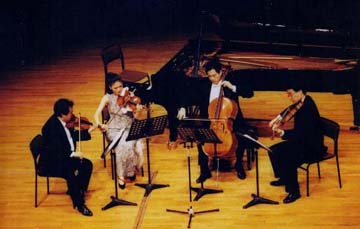The Korea Foundation hosted an international conference and a music concert on December 13-14, 2001 at Seoul Gyoyuk Munhwa Hoegwan, in commemoration of its 10th anniversary. The conference, entitled Korea's Interface with the World: Past, Present and Future was intended to review Korean culture as seen by foreigners and explore ways to facilitate academic and cultural exchanges between Korea and foreign countries. Meanwhile, the concert held at the Seoul Arts Center on December 14 attracted a large turnout of 2,500 people. - Ed.
International Conference
In his keynote speech, former prime minister Lee Hong-koo observed that the global community is currently striving for cultural preservation that is no less important than their environmental protection campaign. In this regard, he stressed that it is increasingly important to respect cultural diversity and endeavor to promote the understanding of different cultures.
As the main topic of Session I was "Changing Images of Korea: Historical Vignettes," scholars from Russia, China and Japan attempted to analyze this issue from a broad and historical perspective. They particularly delved into matters related to typical mechanism as well as orientalism in the process of understanding different cultures and religions.
To be more specific, the scholars talked about Russians's view of Korea in the political context and ways to popularize Korean studies. In addition, they drew attention to recent positive changes in the Chinese perception of Korea and how to reflect this into Chinese history books, along with a comparative approach to Korean and Japanese cultures and their future relationships. Furthermore, they held debate on mechanisms typical of international exchanges and descriptions that are seen in artistic works, as well as orientalism reflected in Western missionaries's perception of Korean Buddhism.
Contemporary Perceptions of KoreaSession II was devoted to analyses of Western scholars's studies on Korean history and the changes in their perceptions of Korea. The participants held discussions as to how non-Koreans perceive and collect Korean paintings, while exploring ways to foster specialists on Korean paintings. Interesting presentations and discussions were made with regard to the international standing of Korean arts as viewed from the cultural and diplomatic perspective and its international brand image from a marketing standpoint.
As for history studies, the scholars pointed to the necessity to advance communication between foreign and Korean academics and share their scholarly achievements. They also dealt with numerous issues, such as mutual relationships between the image of country and the collection pattern of its paintings and their exhibitions, creation of a distinctive Korea image and the increase in the number of foreigners who access information on Korean arts.
Korea's perceptions of the world outside were analyzed in Session III. The participants presented a diverse range of opinions regarding Koreans'attitudes toward the United States and China, teaching world history in Korea, and representations of the promotion of Korean culture overseas in the Korean media. Since academics in Europe have casted doubt about the generality of modernism, Korea needs to redefine the significance and principles of teaching in world history, they opined. Other issues covered included differences in perceptions on the origin of Japanese culture, the Korean media? tendency to play up the Nobel Prize for literature, overseas performances by Korean entertainers and events in which Korean poets read their works in public. The participants also pointed to the tendency of the domestic news media to provide inadequate coverage of local cultural events.
Changing Paradigms of Korean StudiesSession IV featured in-depth presentations and discussions on the coordination of Korean studies abroad. There were discussions on ways to effectively coordinate Korean studies in Korea as well as abroad. Area studies versus a disciplinary approach, course openings for Korean studies, U.S. elementary and secondary school curriculum as it relates to Korea, and the main themes of papers that have been presented at international conferences on Korean studies in recent years were also discussed. There were also talks with regard to the differences in American and European disciplinary approaches to Korean studies, as well as policy aspects of their curriculum, and Korea-related data on the Internet.
A number of current cultural issues that dealt with politics of culture in the Internet age were analyzed during session V. The participants focused on rapid changes brought about by the digital revolution, still-cherished values such as people's ability and mutual trust, Korean society's development through adoption of global standards and historical cases, cultural goods and their exceptions in trade globalization, the cultural identity of overseas ethnic Koreans and the role of teaching in Korean culture.
The final Session of VI heard about the roles of public foundations from many different countries, including representatives from the Japan Foundation, New Zealand's Asia 2000 Foundation, the Korea Society in the United States, the British Council in Korea, the Goethe Institute in Seoul, and the Seoul Office of Asia Foundation.
Tribute to Korean ScholarsMeanwhile, President Kim Dae-jung played host to a dinner for both Korean and foreign participants from the international conference at Cheong Wa Dae on Dec. 13. He complimented those individuals who have devoted themselves to Korean studies and the promotion of exchange with Korea, at the same time stressing the importance of international exchange in the academic and cultural fields. The President voiced the hope that they will make further progress in their pursuits in the years ahead.
During the conference's closing ceremony, Korea Foundation President, Lee In-ho, honored 31 Korean and foreign nationals who are credited with having played significant roles in advancing Korean studies overseas as well as foreigners' understanding of Korea and its cultural heritage. Professor James Grayson from Sheffield University in United Kingdom, Martina Deuchler, professor emeritus of London University and Donald P. Gregg, Chairman of the Korea Society in New York, were awarded special plates with citations for their contributions in promoting Korea's image and its studies.
On hand at the seminar were some 60 prominent persons from 14 countries, including those engaged in Korean studies, specialists on Korean culture and arts and personnel involved in international exchange. In addition, more than 300 Koreans from academic, cultural and news organizations attended the two-day conference, this reflecting their keen interest in the international exchange programs. The Foundation will publish the papers that were presented at the conference.
Music Concert
The anniversary concert held at the Seoul Arts Center on the night of December 14 was a great success. Attending the event were representatives of organizations which maintain cooperative relations with the Foundation, including foreign diplomats based in Korea, and the general public. Despite inclement weather, all 2,500 seats in the Concert Hall were occupied.
The Kumho Asiana Quartet performed Shostakovich's
Piano Quintet OP. 57 and Brahms'
Piano Quartet No. 1 in g minor Op. 25, along with pianist Choi Hie-yon, music professor at Seoul National University. They performed several Christmas carols with the audience calling for encores. The Kumho Quartet, which has played a significant role in enhancing Korea's image overseas through its performances in 60 countries, volunteered this time to perform in commemoration of the Foundation's 10th anniversary. A reception, held in the Concert Hall's lobby following the concert drew an unexpectedly large turnout of some 450 people, including cultural representatives, artists, foreign diplomats and journalists.
 한국국제교류재단
한국국제교류재단 newsletter
newsletter











